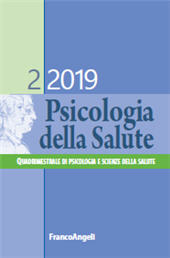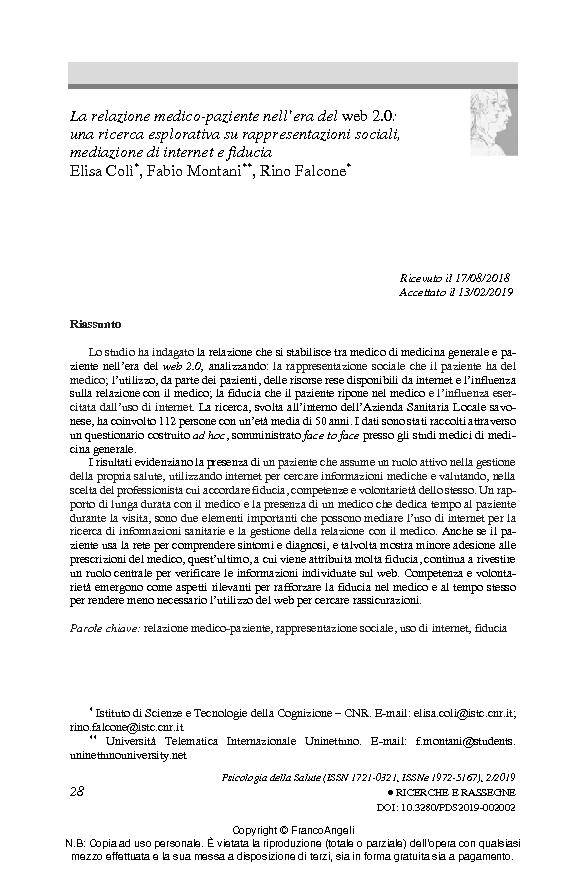2019 - Franco Angeli
Artikel
Digital Version
Herunterladen | Kopieren/Einfügen | Drucken
La relazione medico-paziente nell'era del web 2.0 : una ricerca esplorativa su rappresentazioni sociali, mediazione di internet e fiducia
28-52 p.
- Lo studio ha indagato la relazione che si stabilisce tra medico di medicina generale e paziente nell'era del web 2.0, analizzando: la rappresentazione sociale che il paziente ha del medico; l'utilizzo, da parte dei pazienti, delle risorse rese disponibili da internet e l'influenza sulla relazione con il medico; la fiducia che il paziente ripone nel medico e l'influenza esercitata dall'uso di internet. La ricerca, svolta all'interno dell'Azienda Sanitaria Locale savonese, ha coinvolto 112 persone con un'età media di 50 anni. I dati sono stati raccolti attraverso un questionario costruito ad hoc, somministrato face to face presso gli studi medici di medicina generale. I risultati evidenziano la presenza di un paziente che assume un ruolo attivo nella gestione della propria salute, utilizzando internet per cercare informazioni mediche e valutando, nella scelta del professionista cui accordare fiducia, competenze e volontarietà dello stesso. Un rapporto di lunga durata con il medico e la presenza di un medico che
- dedica tempo al paziente durante la visita, sono due elementi importanti che possono mediare l'uso di internet per la ricerca di informazioni sanitarie e la gestione della relazione con il medico. Anche se il paziente usa la rete per comprendere sintomi e diagnosi, e talvolta mostra minore adesione alle prescrizioni del medico, quest'ultimo, a cui viene attribuita molta fiducia, continua a rivestire un ruolo centrale per verificare le informazioni individuate sul web. Competenza e volontarietà emergono come aspetti rilevanti per rafforzare la fiducia nel medico e al tempo stesso per rendere meno necessario l'utilizzo del web per cercare rassicurazioni. [Testo dell'editore].
- The study investigated the relationship between general practitioner and patient in the Web 2.0 era, analyzing the social representation that the patient has of the doctor, the use by patients of the resources made avalaible by Internet and the influence on the relationship with their doctor, the patient's trust in the doctor and the influence of the internet use. The research, carried out within the Local Health Authority of Savona, involved 112 people with an average age of 50 years. The data were collected through an ad hoc questionnaire, completed at the doctors' offices.esults highlight the presence of a patient who takes an active role in the management of his health, using internet to look for health information, and evaluating skills and willingness of the doctor of which he chose to trust. A long-lasting relationship with the doctor and the presence of a doctor who devotes time to the patient during the visit are two important elements that can mediate the use of the internet for the search of health
- information and for the management of the relationship with the doctor. Even if the patient uses the web to understand his symptoms and physician's diagnosis, and sometimes is less compliant with the doctor's prescriptions, the doctor, who is given a lot of trust, continues to play a central role in verifying the information found on the internet. The competence and the willingness resulted as important elements to strengthen trust in the doctor and to make less necessary the use of the web to look for reassurance. [Publisher's text].
Ist Teil von
Psicologia della salute : quadrimestrale di psicologia e scienze della salute : 2, 2019-
Informationen
ISSN: 1972-5167
KEYWORDS
- Relazione medico-paziente, rappresentazione sociale, uso di internet, fiducia
- Doctor-patient relationship, social representation, internet use, trust
-
In derselben Datei
- Omofobia : origine, conseguenze e prevenzione : una rassegna della letteratura
- La relazione medico-paziente nell'era del web 2.0 : una ricerca esplorativa su rappresentazioni sociali, mediazione di internet e fiducia
- Affetti nella rete : il benessere degli adolescenti tra rischi e opportunità social
- Palliative care and psychology education needs in nursing courses : a focus group study among Italian undergraduates
- Representations of physician's role and their impact on compliance
- The Italian version of the Oral Health Impact Profile (OHIP-14) and its personality correlates
- Comportamenti aggressivi e episodi di violenza a danno degli operatori sanitari : intervento di prevenzione e contrasto



